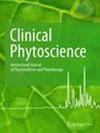Effects of Mucuna milk (Mucuna pruriens L.) on body weight and serum biochemistry in rats fed hyperlipidaemic diet
引用次数: 0
Abstract
Abstract Background Hyperlipidemia and oxidative stress is recognized as risk factor for several diseases such as COVID-19. The aim of this study was to evaluate the effect of oral administration of Mucuna milks on body weight gain, blood lipid levels and redox status in rat model fed high fat diet. Methods Mucuna milks were produced from two varieties of Mucuna seeds. Three controls (I, II, III) made of normal rats fed with standard diet, rats fed with high fat diet and rats fed with high fat diet submitted to oral administration of atorvastatin (10 mg/kg/day). In addition, four test groups (IV, V, VI, VII) made with rats fed high fat diet and received oral administration of 20 mL of vegetable milk per day (10 mL at morning and 10 mL at afternoon). Results Results confirmed that rats on the high fat diet only showed an increasing of about 224% of their initial body weight, abdominal fat and a significant (p < 0.05) increases of lipid peroxidation (MDA) in liver and heart after five weeks. However, oral administration of Mucuna milk inhibit weight gain by about 66% and abdominal fat (54.53–55.60%). The reduction of LDL, VLDL, Triglycerides and Total cholesterol was remarkable in groups of rat treated with vegetable milk, about 67% reduction for dehulled Mucuna milks (DCM, DVM) and 69% reduction for whole Mucuna milks (WCM, WVM). Hyperlipidemic group rats had higher ASAT (134.17 UI/L) and ALAT (101.72 UI/L) levels, but Mucuna milks improved the ASAT and ALAT levels in rats. The reduction of MDA (70 − 50%) was related to phenolic content of Mucuna milks. significant and negative correlations was observed between catalase and MDA (r= -0.86; p = 0.05); MDA and SOD (r = − 0.60; p = 0.05). Conclusion This study suggests that treatment with Mucuna milks have anti-hyperlipidemia properties and increased the activity of antioxidant enzymes.黏液乳对高脂血症大鼠体重及血清生化的影响
背景高脂血症和氧化应激被认为是COVID-19等多种疾病的危险因素。本研究旨在探讨口服Mucuna乳对高脂饲料大鼠模型体重增加、血脂水平及氧化还原状态的影响。方法以两个品种的粘豆种子为原料制备粘豆奶。正常大鼠饲喂标准日粮,高脂日粮饲喂高脂日粮,高脂日粮饲喂阿托伐他汀(10 mg/kg/d),三组对照(ⅰ、ⅱ、ⅲ)。另设4个实验组(IV、V、VI、VII),分别饲喂高脂饲料,每天口服植物乳20 mL(上午10 mL,下午10 mL)。结果结果证实,高脂肪饮食的大鼠仅表现出约224%的初始体重,腹部脂肪和显著的(p <5周后肝脏和心脏脂质过氧化(MDA)升高。然而,口服Mucuna牛奶可抑制约66%的体重增加和腹部脂肪(54.53-55.60%)。植物奶各组大鼠LDL、VLDL、甘油三酯和总胆固醇含量显著降低,去皮Mucuna乳(DCM、DVM)降低约67%,全脂Mucuna乳(WCM、WVM)降低约69%。高脂血症组大鼠ASAT (134.17 UI/L)和ALAT (101.72 UI/L)水平较高,而Mucuna牛奶提高了大鼠ASAT和ALAT水平。丙二醛降低(70 ~ 50%)与乳中酚类物质含量有关。过氧化氢酶与MDA呈显著负相关(r= -0.86;P = 0.05);MDA和SOD (r =−0.60;P = 0.05)。结论Mucuna牛奶具有抗高脂血症和提高抗氧化酶活性的作用。
本文章由计算机程序翻译,如有差异,请以英文原文为准。
求助全文
约1分钟内获得全文
求助全文
来源期刊
自引率
0.00%
发文量
18
审稿时长
13 weeks
期刊介绍:
Clinical Phytoscience is an international, peer-reviewed, interdisciplinary, and open access journal publishing high quality research articles on clinical evidence and use of medicinal plants in the development of efficient and well tolerated phytotherapy. Clinical Phytoscience focuses on phytotherapy, looking at proof of concept, efficacy and safety, to be established “at eye level” compared to pharmacotherapy. The emphasis lies on application oriented topics (efficacy and safety of phytotherapy in a specific indication, including its need and acceptance by the patient). The scientific results published in the journal should contribute to the recovery and maintenance of human health by phytotherapy. Clinical Phytoscience will publish high-quality evidence-based clinical studies and relevant pharmacological studies. Key areas of interest are: -Upper and lower airways, ENT and pneumology -Gynecology -Urology -Nephrology Pediatrics -Intestinal tract -Hepatology -Diabetes/metabolic Syndrome -Immunology and microbiology -Hygiene -Analytics

 求助内容:
求助内容: 应助结果提醒方式:
应助结果提醒方式:


